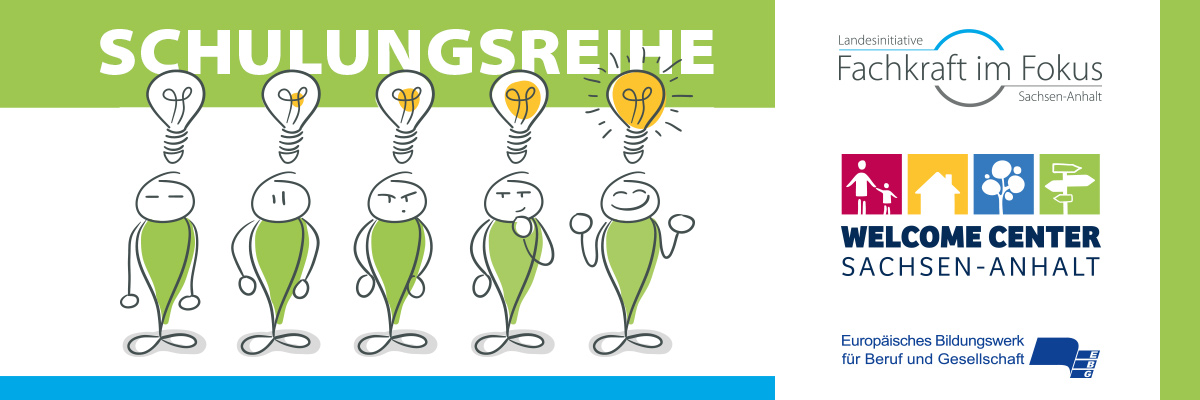
© Landesinitiative Fachkraft im Fokus
The WelcomeCenter Saxony-Anhalt offers various training courses on the basics and current topics of labour market integration to support regional full-time and voluntary actors and all other interested parties. In this context, you have the opportunity to familiarise yourself with the legal foundations, obtain up-to-date background information and exchange ideas with other stakeholders about regional challenges. We look forward to your registration for one or more online dates. Face-to-face events are also available on request.
Link to registration: https://www.surveymonkey.de/r/WCST-Schulungen_2023
Overview of the next training dates:
Title | Training dates |
Introduction to the legal basis and access to the labour market for refugees | 18.10.2023, 14:00 - 17:00 15.11.2023, 14:00 - 17:00 hrs |
Tolerance to undergo training | 25 October 2023, 14:00 - 16:00 22.11.2023, 14:00 - 16:00 |
Immigration law for skilled labour | 08.11.2023, 14:00 - 16:00 29 November 2023, 14:00 - 16:00 |
EU citizens | 06.12.2023, 14:00 - 16:00 |
Residence Opportunities Act | 13/12/2023, 14:00 - 16:00 |
The training courses are organised by the European Training Centre for Work and Society.
The individual modules in detail:
Introduction to the legal basis and labour market access for refugees
In this module of our training series, we provide an overview of the legal basis and labour market access for refugees. This includes, among other things
- Topic-specific terminology
- How does an asylum procedure work
- Overview of the different statuses and the associated documents
- The residence statuses in detail
- Right to stay regulation according to § 25a and § 25b AufenthG
- Family reunification
- Residence regulations and
- First basics of the right of residence
Tolerated stay for education
The tolerated stay for training is a special type of tolerated stay that requires the completion of at least two years of training. As the subject area is extensive, the module "Ausbildungsduldung" contains the following content in addition to a general introduction:
- The regulation in the wording
- Group of persons for training toleration
- Period of validity and transitions
- Requirements for training toleration
- Right of residence for family members
- Application procedure (step-by-step procedure)
- Training assistance benefits in the case of training toleration
- Further grounds for exclusion
- Employment toleration
Skilled Labour Immigration Act
The Skilled Immigration Act, the first version of which has been in force since 2020, makes it easier for skilled workers with vocational training or academic qualifications and people with practical vocational knowledge to immigrate to Germany. The first changes are already coming into force this year and are intended to further simplify the recruitment of employees from abroad. The following topics, among others, will be explained in the training course:
- Immigration of skilled labour: how the process works under different conditions
- Recognition of foreign qualifications
- Shortened deadlines for issuing a settlement permit for skilled workers
- Accelerated skilled labour procedure
- Innovations from 11/2023 and 03/2024
EU citizens
EU citizens enjoy many freedoms and comprehensive protection: personal, civil, political, economic and social rights, protection of personal data and protection against discrimination as well as freedom of movement without border controls in most EU countries. All EU citizens have the right to enter the member states of the EU, the EEA (EU plus Iceland, Liechtenstein and Norway) and Switzerland without a visa. EU citizens also have the right to reside and work in other countries with virtually no restrictions and without special authorisation (see www.bmi.bund.de/DE/themen/migration/aufenthaltsrecht/freizuegigkeit-eu-buerger/freizuegigkeit-eu-buerger-node.html).
This course explains how this works in detail and what exceptions there are. The detailed content is as follows:
- General information on EU citizens and countries with special rights
- General principles of residence law
- Requirements for EU migrants on the German labour market
- Funding and support options for EU migrants
- Funding opportunities for language and integration courses
- Recognition of qualifications
- Self-employment and pension insurance
- Social benefits for EU migrants
- Counselling centres for EU migrants in Saxony-Anhalt
Residence Opportunities Act
The new law on the Right of Residence with Opportunities came into force on 31 December 2022. The Right of Residence on Opportunity is a residence permit for 18 months. The training explains in detail which requirements apply for an application.

